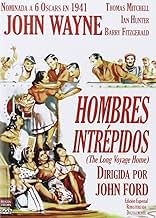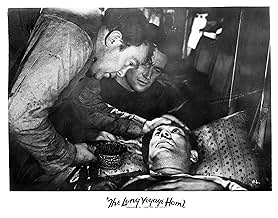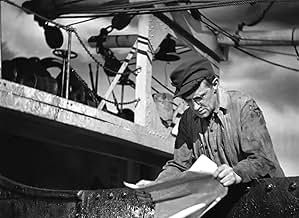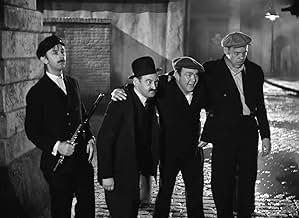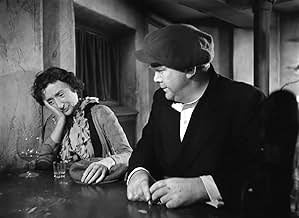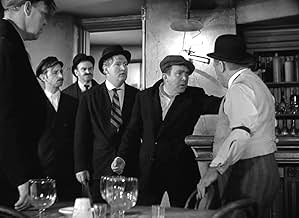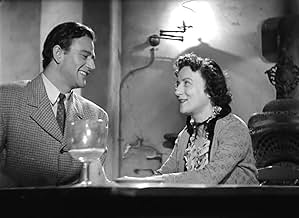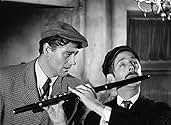AVALIAÇÃO DA IMDb
6,9/10
5,3 mil
SUA AVALIAÇÃO
Adicionar um enredo no seu idiomaA merchant ship's crew tries to survive the loneliness of the sea and the coming of war.A merchant ship's crew tries to survive the loneliness of the sea and the coming of war.A merchant ship's crew tries to survive the loneliness of the sea and the coming of war.
- Indicado a 6 Oscars
- 8 vitórias e 7 indicações no total
Wilfrid Lawson
- Captain
- (as Wilfred Lawson)
Joe Sawyer
- Davis
- (as Joseph Sawyer)
Constant Franke
- Norway
- (as Constant Frenke)
David Hillary Hughes
- Scotty
- (as David Hughes)
- Direção
- Roteiristas
- Elenco e equipe completos
- Produção, bilheteria e muito mais no IMDbPro
Avaliações em destaque
The Long Voyage Home (1940)
Any movie with Gregg Toland behind the camera is worth watching, with an emphasis on the visual experience. From Wuthering Heights (1939) to the Little Foxes, Ball of Fire, and Citizen Kane (all 1941), in three years, Toland lifted (again) the standards of the best Hollywood could do. This isn't just me saying this, and of course there are other great cinematographers, but if you've seen these movies you know they are exceptional. I falls right in the middle of this great stretch, and it has the revered John Ford directing, letting Toland do his thing, right from the first scene.
This is a solid, sometimes moving, sometimes dramatic movie, for sure. But the long first part is a composite of manly clichés: drinking, fighting, and womanizing. It's all in good fun, in a way, and the exoticness is made to sell movies. But there's quite a lot of nothing going on beyond seducing native women in some unnamed distant land. The dancing and fighting are filmed with Toland perfection, but it turns quickly to farce, or stereotype.
Thomas Mitchell is a lively Irishman in his best form, and John Wayne is an improbable Swede, and doesn't stand out much from the bunch except toward the end, when he is a block of wood with a bad accent. The story is a series of misunderstandings and friendships, but since the plot is made of four different Eugene O'Neill plays (from 20 years earlier), there is a little discontinuity to it all.
All of this is set during that strange cusp between World War II beginning in Europe and the U.S. still not joining in. The ship is carrying ammunition, and hints of things that really matter are given right at the start, with some news reports crackling into the seeming isolation of the ship. As the captain says as they are to depart from New York with the military cargo, "If it doesn't get there it'll be missed. But we won't."
Isolationism gets a more famous treatment in Casablanca two years later, after the Americans are already at war, so in a way, a big name movie like this had more potential influence on American sentiment. It's fascinating to see this Walter Wanger/John Ford/John Wayne collaboration after their breakthrough Stagecoach the year before (producer, director, star). But the stakes are raised, and the production level is much higher.
Any movie with Gregg Toland behind the camera is worth watching, with an emphasis on the visual experience. From Wuthering Heights (1939) to the Little Foxes, Ball of Fire, and Citizen Kane (all 1941), in three years, Toland lifted (again) the standards of the best Hollywood could do. This isn't just me saying this, and of course there are other great cinematographers, but if you've seen these movies you know they are exceptional. I falls right in the middle of this great stretch, and it has the revered John Ford directing, letting Toland do his thing, right from the first scene.
This is a solid, sometimes moving, sometimes dramatic movie, for sure. But the long first part is a composite of manly clichés: drinking, fighting, and womanizing. It's all in good fun, in a way, and the exoticness is made to sell movies. But there's quite a lot of nothing going on beyond seducing native women in some unnamed distant land. The dancing and fighting are filmed with Toland perfection, but it turns quickly to farce, or stereotype.
Thomas Mitchell is a lively Irishman in his best form, and John Wayne is an improbable Swede, and doesn't stand out much from the bunch except toward the end, when he is a block of wood with a bad accent. The story is a series of misunderstandings and friendships, but since the plot is made of four different Eugene O'Neill plays (from 20 years earlier), there is a little discontinuity to it all.
All of this is set during that strange cusp between World War II beginning in Europe and the U.S. still not joining in. The ship is carrying ammunition, and hints of things that really matter are given right at the start, with some news reports crackling into the seeming isolation of the ship. As the captain says as they are to depart from New York with the military cargo, "If it doesn't get there it'll be missed. But we won't."
Isolationism gets a more famous treatment in Casablanca two years later, after the Americans are already at war, so in a way, a big name movie like this had more potential influence on American sentiment. It's fascinating to see this Walter Wanger/John Ford/John Wayne collaboration after their breakthrough Stagecoach the year before (producer, director, star). But the stakes are raised, and the production level is much higher.
John Wayne is misleadingly top-billed ,presumably to bring in the crowds who thought they were going to see typical Wayne heroics in this one.He is actually part of an excellent ensemble cast in this film,which has seamlessly adapted by Dudley Nichols from a group of one-act plays by the great Eugene O'Neill. Nichols' writing is so good that unless you're an O'Neill expert,it is VERY difficult to tell where O'Neill leaves off and Nichols takes over,except perhaps in the episode involving British actor Ian Hunter (in the performance of a lifetime) as a presumed German spy. The plays,written in the early 1900's,have been updated to take place during WW II,but the propaganda angle is very tastefully handled and almost non-existent;in fact,here Nichols and director John Ford show great respect for the integrity of O'Neill's plays.
The cast is excellent,but Wayne actually hasn't got much to do in comparison with his other films,and this is a film of dialogue,not action.Perhaps that's why the previous reviewer found it interminable. [John Wayne uses a Swedish (!) accent in this movie,which he actually does quite well--don't laugh!] The most intense acting is done by Thomas Mitchell (Scarlett O'Hara's dad in "Gone With The Wind") and Barry Fitzgerald,who are actually the stars of the movie.And director John Ford shows us what a true master of his craft he is by equalling Hitchcock's accomplishment in "Lifeboat" in keeping the action confined to a small space without making it seem tiresome. The back-and-white photography is stunningly good--the best American photography in a black-and-white 1940's American film,aside from "Citizen Kane",of course.
John Wayne fans shouldn't pass this one up,and all non-fans should still enjoy this fine film.
The cast is excellent,but Wayne actually hasn't got much to do in comparison with his other films,and this is a film of dialogue,not action.Perhaps that's why the previous reviewer found it interminable. [John Wayne uses a Swedish (!) accent in this movie,which he actually does quite well--don't laugh!] The most intense acting is done by Thomas Mitchell (Scarlett O'Hara's dad in "Gone With The Wind") and Barry Fitzgerald,who are actually the stars of the movie.And director John Ford shows us what a true master of his craft he is by equalling Hitchcock's accomplishment in "Lifeboat" in keeping the action confined to a small space without making it seem tiresome. The back-and-white photography is stunningly good--the best American photography in a black-and-white 1940's American film,aside from "Citizen Kane",of course.
John Wayne fans shouldn't pass this one up,and all non-fans should still enjoy this fine film.
An expressionistic classic featuring John Wayne as a Swede? Can it be?
"The Long Voyage Home" may fall just short of classic status, but it is one of Hollywood's most visually expressionistic films, a tone poem of shadow and light presented by director John Ford and cinematographer Gregg Toland. That is indeed the Duke himself, John Wayne, playing a Swedish hayseed named Ole Olsen who the other sailors aboard his ship want to see safely en route to home. He's not Meryl Streep as it turns out, but you will want to see this powerhouse example of Hollywood art anyway for Toland's camera-work, the ensemble acting, and Dudley Nichols' seamless adaptation of Eugene O'Neill's four one-act plays.
O'Neill's sea yarns are transported to the then-present. World War II is underway, and the Glencairn transports ammunition to England for the fight against Hitler. Will Ole return home? What is the secret behind quiet English sailor Smitty (Ian Hunter)? Why are women bearing baskets of fruit not to be trusted? Why is Driscoll (Thomas Mitchell) so suspicious of that bartender?
Pauline Kael once wrote up "Long Voyage Home" by way of addressing another film shot by Gregg Toland the following year, "Citizen Kane." Both Ford and "Kane" director Orson Welles took the unusual step of sharing their titles card with Toland, a show of respect for what Toland's eye brought to their films. I'd say Toland brought more to "Long Voyage Home" than he did to "Kane," as every shot seems suffused with a tenseness and mood that at the very least speaks as eloquently to the drama on screen as any line of dialogue or actor's performance.
That's true from the opening shot, a wordless pan shot of the Glencairn drifting across the water as women in the foreground gyrate sensuously to an unseen music. The images are contrasted with those of Glencairn sailors looking pent-up and frustrated. Are the women really there on the shore, or just being imagined by the crew? It's a classic bit of expressionist ambiguity that, once established, carries through for the rest of the film.
Take the case of Smitty, a fellow who no one can much figure out as he keeps to himself, at least until he is finally fingered as a likely German spy in a sequence that might appear contrived had not Nichols, Toland, and Hunter made it quite diabolically real. Ian Hunter is not a well-known actor today, but he carries the film as long as he's around, especially while confronted with his apparent treachery. Watching him grimace and shake with fury as his secret is slowly, gut-wrenchingly exposed is the strongest scene in this very strong film, and once the film moves beyond Smitty, it never quite recovers. Hunter also appears in "Adventures Of Robin Hood" as a similar figure of dual identities, and I won't make the mistake of underestimating him again.
I only wish Thomas Mitchell, the Oscar winner from Ford's "Stagecoach" the previous year, had brought some restraint to his playing of Driscoll here. Barry Fitzgerald and John Qualen, Ford vets both, seem to catch his overacting bug. It's not pretty, especially to those of us who have seen all three give better work.
Wayne, however, is effective despite his dodgy accent, and it's interesting to see him in a film, just a year after his breakthrough in "Stagecoach," where he is presented to us as one of the gang, something of a follower and not a lone-wolf leader. I don't normally associate Wayne with amiable go-alongness, but he carries it here.
John Ford is pretty much the Shakespeare of cinema, effortlessly moving from comedy to tragedy within a single scene, and "Long Voyage Home," while not perfect, makes a strong case for his visionary mastery.
"The Long Voyage Home" may fall just short of classic status, but it is one of Hollywood's most visually expressionistic films, a tone poem of shadow and light presented by director John Ford and cinematographer Gregg Toland. That is indeed the Duke himself, John Wayne, playing a Swedish hayseed named Ole Olsen who the other sailors aboard his ship want to see safely en route to home. He's not Meryl Streep as it turns out, but you will want to see this powerhouse example of Hollywood art anyway for Toland's camera-work, the ensemble acting, and Dudley Nichols' seamless adaptation of Eugene O'Neill's four one-act plays.
O'Neill's sea yarns are transported to the then-present. World War II is underway, and the Glencairn transports ammunition to England for the fight against Hitler. Will Ole return home? What is the secret behind quiet English sailor Smitty (Ian Hunter)? Why are women bearing baskets of fruit not to be trusted? Why is Driscoll (Thomas Mitchell) so suspicious of that bartender?
Pauline Kael once wrote up "Long Voyage Home" by way of addressing another film shot by Gregg Toland the following year, "Citizen Kane." Both Ford and "Kane" director Orson Welles took the unusual step of sharing their titles card with Toland, a show of respect for what Toland's eye brought to their films. I'd say Toland brought more to "Long Voyage Home" than he did to "Kane," as every shot seems suffused with a tenseness and mood that at the very least speaks as eloquently to the drama on screen as any line of dialogue or actor's performance.
That's true from the opening shot, a wordless pan shot of the Glencairn drifting across the water as women in the foreground gyrate sensuously to an unseen music. The images are contrasted with those of Glencairn sailors looking pent-up and frustrated. Are the women really there on the shore, or just being imagined by the crew? It's a classic bit of expressionist ambiguity that, once established, carries through for the rest of the film.
Take the case of Smitty, a fellow who no one can much figure out as he keeps to himself, at least until he is finally fingered as a likely German spy in a sequence that might appear contrived had not Nichols, Toland, and Hunter made it quite diabolically real. Ian Hunter is not a well-known actor today, but he carries the film as long as he's around, especially while confronted with his apparent treachery. Watching him grimace and shake with fury as his secret is slowly, gut-wrenchingly exposed is the strongest scene in this very strong film, and once the film moves beyond Smitty, it never quite recovers. Hunter also appears in "Adventures Of Robin Hood" as a similar figure of dual identities, and I won't make the mistake of underestimating him again.
I only wish Thomas Mitchell, the Oscar winner from Ford's "Stagecoach" the previous year, had brought some restraint to his playing of Driscoll here. Barry Fitzgerald and John Qualen, Ford vets both, seem to catch his overacting bug. It's not pretty, especially to those of us who have seen all three give better work.
Wayne, however, is effective despite his dodgy accent, and it's interesting to see him in a film, just a year after his breakthrough in "Stagecoach," where he is presented to us as one of the gang, something of a follower and not a lone-wolf leader. I don't normally associate Wayne with amiable go-alongness, but he carries it here.
John Ford is pretty much the Shakespeare of cinema, effortlessly moving from comedy to tragedy within a single scene, and "Long Voyage Home," while not perfect, makes a strong case for his visionary mastery.
10JimB-4
Reportedly, John Ford's film of The Long Voyage Home was Eugene O'Neill's favorite of all filmed versions of his plays, and it is no task to see why. The worlds of Ford and O'Neill overlap in their use of sentiment, tragicomedy, and the sons of old Ireland. This episodic collection of stories, taken from several short plays written by O'Neill and based on his own seafaring life, does what both O'Neill and Ford do best--unveil the poetry and tragedy of simple men. Granted, Ford outsentimentalizes O'Neill, who can be far darker than Ford ever dared, but he comes by it honestly--no Capra-corn here. The photography and sound bring a hyper-reality to this tale of merchant sailors, fearful for their lives, argumentative yet loving, full of weakness but capable of strength and honor. The performances are uniformly splendid. John Wayne, in a supporting role, does quite well with an unusual part, a lonely Swedish sailor, and his accent is much better than he is usually given credit for. But this is no star vehicle. The ship is the star, and the lives of its men resound with meaning and melancholy. An extraordinary film experience, especially for the patient and thoughtful among us.
The Long Voyage Home is a compilation film of four one act plays by Eugene O'Neill who some will argue is America's greatest dramatist. The man who did the stitching together of O'Neill's work about the crew of the S.S. Glencairn is Dudley Nichols and presiding over it all is the direction of John Ford.
Mr. Ford is usually someone who really puts an individual stamp on one of his movies. But the usual Ford trademarks are noticeably absent from The Long Voyage Home. Probably in mood and style the film of Ford's this comes closest to is The Informer. In fact J.M. Kerrigan is playing almost the same part in this as he did in The Informer.
One thing Ford always did was use the right kind of music to set the tone for a film. Those 19th century ballads like I Dream of Jeannie that work so well in something like Stagecoach are substituted for Harbor Lights. That song expresses so well the longing of a whole bunch of rootless men to find some kind of stability in their lives.
Eugene O'Neill spent many years at sea and the characters of these men on the S.S. Glencairn are drawn from his own youthful experience. Most of our planet is covered by water and no country owns it. It's just called the high seas and the seamen on it are an international fraternity, like the S.S. Glencairn crew. I've always felt that O'Neill was trying to say that if there's any salvation to be had in this old world, it's to be found on the salt water. It's the only place where all kinds of people really work for a common goal, stay alive and make the trip.
The original plays had a World War I background, but it has been updated for World War II. Especially in the part when the crew becomes convinced that Ian Hunter is some kind of spy. Certainly the second World War in 1940 gave the audiences some real interest. Ian Hunter may have given his career performance in this as Smitty. Turns out he's far from what everyone suspects.
Hard to believe that John Wayne would be in a film by one of our greatest dramatists. But the Duke holds his own in the ensemble. It's the only time he ever attempted some kind of accent and he pulls it off. But I'm sure he thought once was enough.
Wayne as Olsen is the innocent of the group, maybe the only time he's ever been that on the screen. The rest of the crew makes every effort to see he does in fact get home to Sweden. It turns out to cost one of them his life ultimately.
If you're any kind of depressed, The Long Voyage Home or any Eugene O'Neill is not good for your mental health. He's one pessimistic fellow that O'Neill. But his insights into our character and soul are always penetrating as they are in The Long Voyage Home.
Mr. Ford is usually someone who really puts an individual stamp on one of his movies. But the usual Ford trademarks are noticeably absent from The Long Voyage Home. Probably in mood and style the film of Ford's this comes closest to is The Informer. In fact J.M. Kerrigan is playing almost the same part in this as he did in The Informer.
One thing Ford always did was use the right kind of music to set the tone for a film. Those 19th century ballads like I Dream of Jeannie that work so well in something like Stagecoach are substituted for Harbor Lights. That song expresses so well the longing of a whole bunch of rootless men to find some kind of stability in their lives.
Eugene O'Neill spent many years at sea and the characters of these men on the S.S. Glencairn are drawn from his own youthful experience. Most of our planet is covered by water and no country owns it. It's just called the high seas and the seamen on it are an international fraternity, like the S.S. Glencairn crew. I've always felt that O'Neill was trying to say that if there's any salvation to be had in this old world, it's to be found on the salt water. It's the only place where all kinds of people really work for a common goal, stay alive and make the trip.
The original plays had a World War I background, but it has been updated for World War II. Especially in the part when the crew becomes convinced that Ian Hunter is some kind of spy. Certainly the second World War in 1940 gave the audiences some real interest. Ian Hunter may have given his career performance in this as Smitty. Turns out he's far from what everyone suspects.
Hard to believe that John Wayne would be in a film by one of our greatest dramatists. But the Duke holds his own in the ensemble. It's the only time he ever attempted some kind of accent and he pulls it off. But I'm sure he thought once was enough.
Wayne as Olsen is the innocent of the group, maybe the only time he's ever been that on the screen. The rest of the crew makes every effort to see he does in fact get home to Sweden. It turns out to cost one of them his life ultimately.
If you're any kind of depressed, The Long Voyage Home or any Eugene O'Neill is not good for your mental health. He's one pessimistic fellow that O'Neill. But his insights into our character and soul are always penetrating as they are in The Long Voyage Home.
Você sabia?
- CuriosidadesBarry Fitzgerald, who plays the character of Cocky, and Arthur Shields, who played Donkeyman, were brothers in real life. They also appeared together in director John Ford's Depois do Vendaval (1952).
- Erros de gravaçãoAt the beginning of the film, when Driscoll sneaks back to the ship, he jumps from a rowboat into the water and climbs up the anchor chain. The next time onscreen, he appears dry from head to toe.
- ConexõesFeatured in Film Preview: Episode #1.2 (1966)
- Trilhas sonorasBlow the Man Down
(uncredited)
Traditional
Played during the opening credits
Sung often by crewmen
Sung a cappella by J.M. Kerrigan
Variations played as part of the score
Principais escolhas
Faça login para avaliar e ver a lista de recomendações personalizadas
- How long is The Long Voyage Home?Fornecido pela Alexa
Detalhes
- Data de lançamento
- País de origem
- Idiomas
- Também conhecido como
- A Longa Volta Para Casa
- Locações de filme
- Los Angeles Harbor, Wilmington, Los Angeles, Califórnia, EUA(scenes on S.S. Munami)
- Empresas de produção
- Consulte mais créditos da empresa na IMDbPro
Bilheteria
- Orçamento
- US$ 682.495 (estimativa)
- Tempo de duração
- 1 h 45 min(105 min)
- Cor
- Proporção
- 1.37 : 1
Contribua para esta página
Sugerir uma alteração ou adicionar conteúdo ausente

